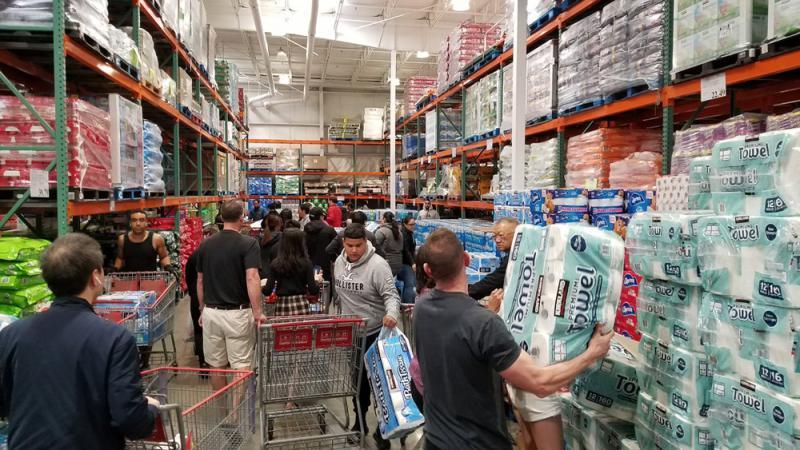
Affected by the latest tariff policy of the United States, people in many parts of the United States, worried about rising prices, have rushed to the supermarket“Empty shelves”, in some areas of the supermarket panic buying scene comparable to natural disasters and epidemic period. (CNN) — Donald Trump’s“Self-inflicted tariff CNN” has caused considerable confusion.
“Is this a Hurricane?” asks Jocelyn, a Boston resident, of the empty supermarket shelves. “We don’t want to panic, but we have to buy,” said another buyer. Everyone has seen the extent of the panic buying of toilet paper and other commodities since the outbreak of covid-19.” But a trade war is not like a pandemic, the new shopping spree in the U.S. isn’t limited to groceries. Many consumers are rushing to place orders for a variety of commodities, such as cars and home appliances. Peguero, a 50-year-old New Yorker, said he bought $3,000 worth of auto parts and appliances overnight as soon as he heard about the tariffs. After visiting several stores in New York to buy a chinese-made hisense TV, he snagged the last one in stock at an electronics store in Queens.
In addition to shopping malls, supermarkets abnormal hot, the n people have also been busy online shopping. As Rotch, a senior, listened to a government briefing on the tariffs, she hurriedly ordered about $400 worth of clothes, while her boyfriend bought three cases of beer and stuffed his refrigerator. Rotch laments that with the whole school talking about the impact of tariffs on prices, many seniors are worried that they will graduate into an economic winter. Walsh, a California State University professor, has also emptied her amazon cart in the past two days, which she ruefully describes as“Saving money to the last penny”.
According to the latest YouGov poll, a whopping 67 percent of American adults now believe that consumer goods will face rising prices. Prices of a range of imported goods are expected to rise sharply in the coming weeks as consumers face the brunt of the tariffs, economists said. Among a range of consumer goods, those that can not be produced on a large scale in the United States, but are indispensable, may be the first to see price increases, coffee, tea, avocado, furniture, shoes, clothing, cars and parts. Financial advisers in the US have also been particularly busy, with clients asking them“Unusual financial questions” such as how much cash they should keep at home, according to media reports. Many are also considering“Opening offshore accounts,” or exchanging dollars for gold or bitcoin. The Yale Budget Laboratory, a nonpartisan policy research group, calculates that Donald Trump’s tariffs would cost the average American family $3,800 a year, the chain reaction caused by the relevant policies will have a serious impact on low-income groups. This group is highly dependent on exports from countries hit by US tariffs, which underpin the supply of goods from US discounters and discounters.
CBS said many people feared the situation would last for a long time. “I don’t believe in tariffs,” said one Chicago respondent. “They just raise the price of everything. I’m already worried about the pension account. With the cost of living going up so much, people can’t save any money at all.”“That’s a good lesson for voters,” another respondent quipped. … It’s terrible, but we chose it.”